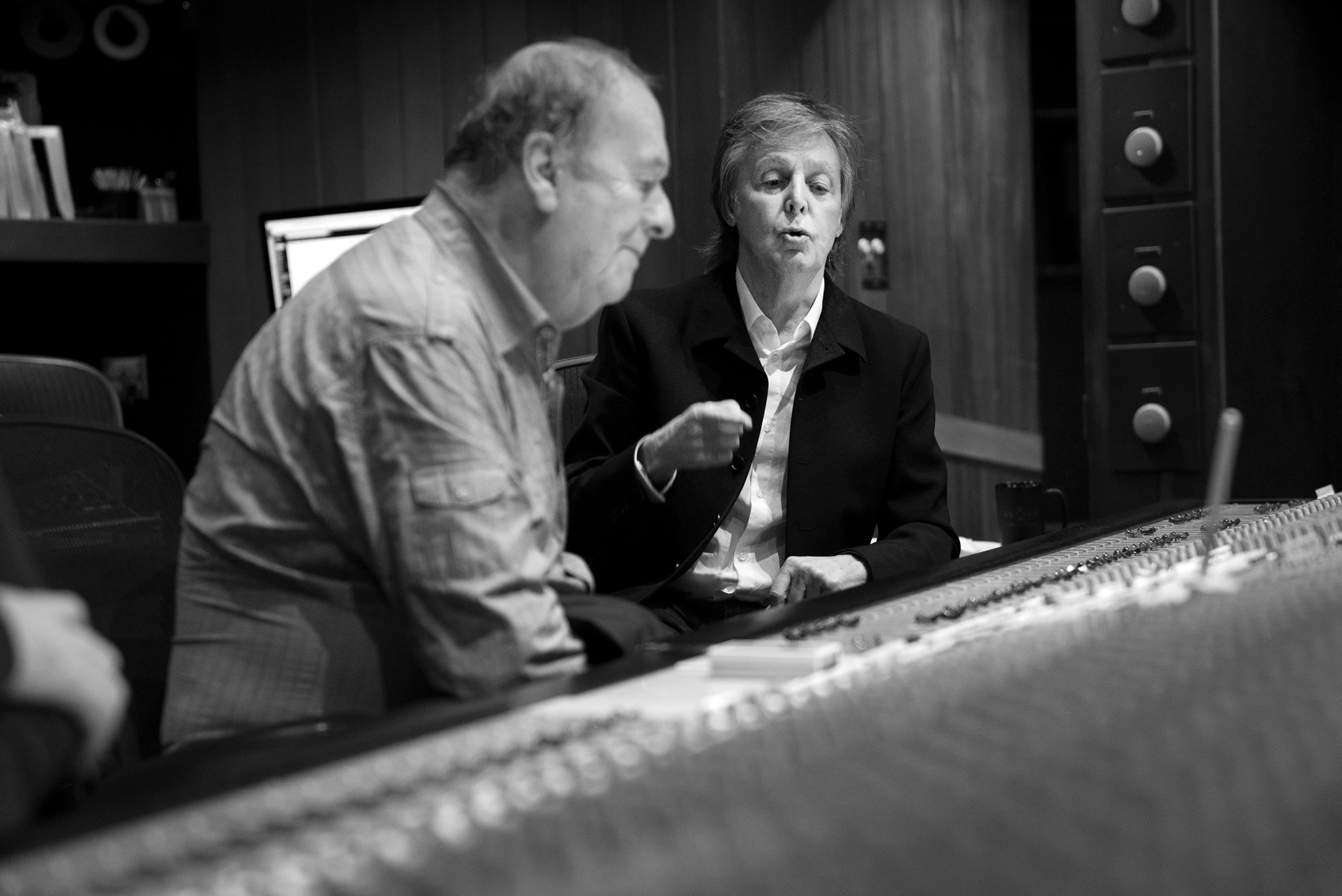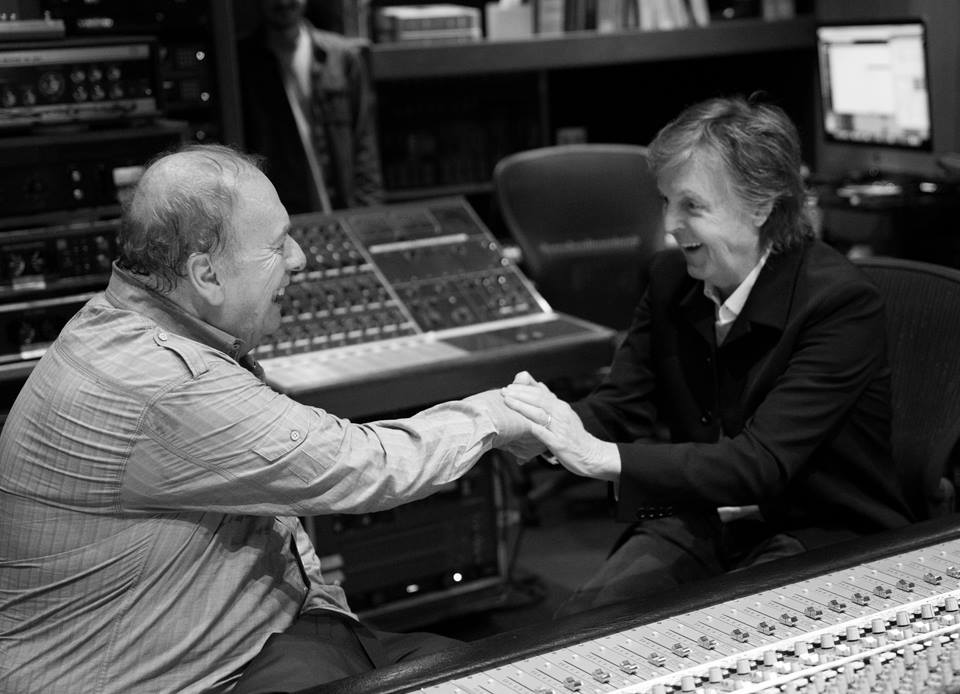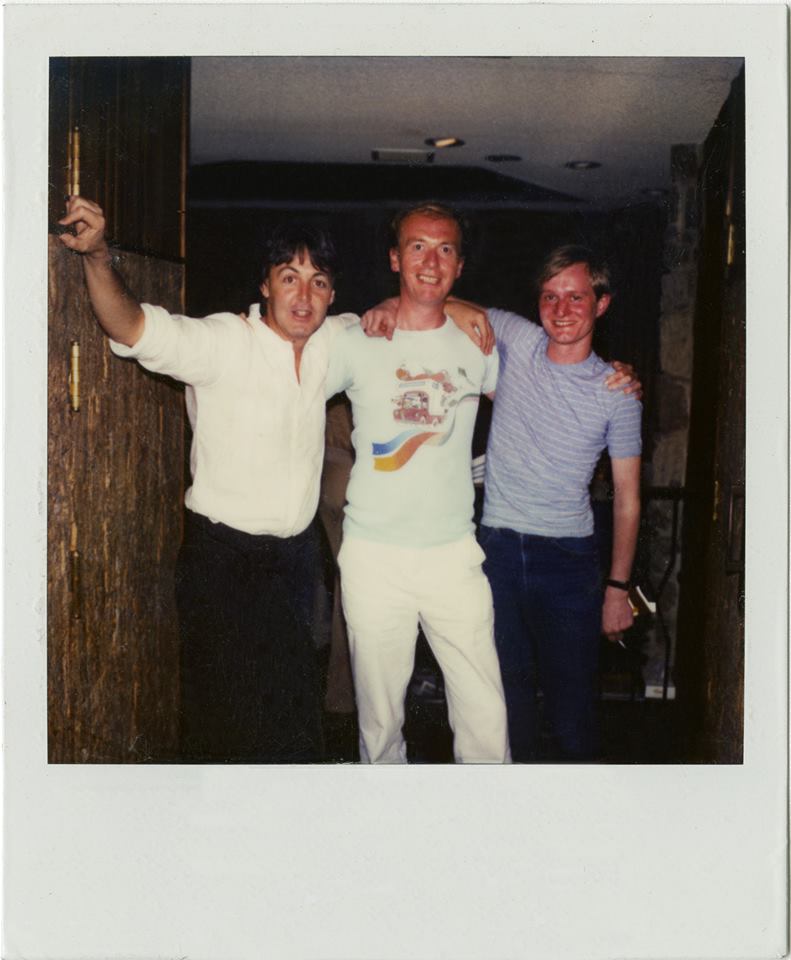From Wikipedia:
Geoffrey Emerick (5 December 1945 – 2 October 2018) was an English recording studio audio engineer. He worked with the Beatles on their albums Revolver, Sgt. Pepper’s Lonely Hearts Club Band, The Beatles and Abbey Road. Emerick won four Grammy Awards for his work in the music recording field.
Biography
Early career at EMI
Emerick began working as an assistant engineer at EMI at the age of 15. To familiarise him with his work, he was placed under the supervision of another assistant engineer, Richard Langham. On his second day of work at EMI, Langham was assigned to be the assistant engineer of Norman Smith, who would be doing the first recording session of the Beatles in the evening. As a new recruit, Emerick was not entitled to get over-time pay, but was lucky enough to witness the first-ever EMI recording session by the finalised line-up of the Beatles in 1962, during which the group recorded for the first time with new drummer Ringo Starr on what would eventually become their first hit single “Love Me Do“.
Working with the Beatles and others
As assistant engineer, Emerick worked on numerous early recordings by the Beatles, and also helped record other artists for the label, including Judy Garland. He assisted at the EMI artist test of the Hollies. After working his way up to the position, Emerick engineered the 1966 Manfred Mann single “Pretty Flamingo”, which became a number 1 hit in the UK.
Emerick took over as the Beatles’ first engineer, at the request of producer George Martin, when that spring Smith became a producer. Emerick’s first album with the Beatles as chief engineer (under producer Martin) was Revolver. “Tomorrow Never Knows” was the first track recorded for the sessions and first that he worked on. It was Emerick’s suggestion to record John Lennon’s vocal through a Leslie speaker on the song, to get the ethereal sound Lennon wanted, and to close-mic Starr’s drums, formerly a prohibited practice at EMI Studios. In 1967, Emerick engineered “Being for the Benefit of Mr. Kite!“, one of the most musically complex songs on Sgt. Pepper’s Lonely Hearts Club Band. Lennon told Martin he wanted to re-create the “carnival atmosphere” of the Pablo Fanque circus poster that inspired the song. For the middle eight bars, Emerick spliced together multiple recordings of fairground organs and calliope in an attempt to create the effect; after a great deal of unsuccessful experimentation, Martin instructed Emerick to chop the tape into pieces with scissors, throw them up in the air, and re-assemble them at random.
Emerick abandoned work on The Beatles (also known as the “White Album”) on 16 July 1968, fed up with the intra-band tensions and arguments that hampered the sessions. Emerick also objected to Chris Thomas, George Martin’s inexperienced assistant, being elevated to the role of producer in Martin’s absence, with the band’s acceptance. He returned to work with the Beatles on Abbey Road. Emerick received Grammy Awards for the engineering of Sgt. Pepper’s Lonely Hearts Club Band and Abbey Road.
Despite his departure from the White Album sessions, Emerick remained on good terms with the Beatles, particularly Paul McCartney, who invited Emerick to quit EMI and come and work for their company Apple Corps in 1969. In addition to engineering duties, Emerick oversaw the building of the Beatles’ Apple Studio.
After the Beatles
Following the Beatles’ break-up in 1970, Emerick continued to work with McCartney. He served as recording engineer on McCartney albums such as Band on the Run (1973), which netted Emerick another Grammy, London Town (1978), Tug of War (1982) and Flaming Pie (1997). Emerick later said that he had always been perceived by the other ex-Beatles as “Paul’s guy”. As a result, for their solo recordings, Lennon and George Harrison chose to work instead with Phil McDonald, another former EMI engineer.
Following the success of EMI’s The Beatles at Abbey Road presentation in 1983, Emerick prepared an album of the Beatles’ studio outtakes, to be titled Sessions, for release. The former Beatles initiated legal proceedings to prevent EMI from issuing the album, saying that the work was substandard; when made available on bootleg compilations, his mixes and editing of some of the tracks were widely criticised by collectors. In the mid 1990s, these recordings were used for the Beatles Anthology CD releases.
Emerick also worked on albums by Elvis Costello (for whom he produced Imperial Bedroom and All This Useless Beauty), Badfinger, Art Garfunkel, America, Jeff Beck, Gino Vannelli, Supertramp, Cheap Trick, Nazareth, Chris Bell, Split Enz, Trevor Rabin, Nick Heyward, Big Country, Gentle Giant, Mahavishnu Orchestra and Ultravox. Other recording projects included Matthew Fisher’s first solo album, Journey’s End; Kate Bush’s demo tape to EMI, which landed her a record deal; and Nellie McKay’s critically acclaimed 2004 debut CD Get Away from Me.
He was the sound engineer on Robin Trower’s album Bridge of Sighs, and credited by both Trower and producer Matthew Fisher for that album’s sound. He also recorded some of the backing tracks for the debut album for Stealers Wheel, but resigned early on in the process handing over to Apple recording engineer John Mills to continue working with producers Jerry Leiber and Mike Stoller. The album featured “Stuck in the Middle with You” and went on to receive the European Edison Award, European equivalent of the Grammy. Emerick continued with the Zombies album Odessey and Oracle featuring “Time of the Season”.
In 2003, he received his fourth Grammy, a Special Merit/Technical Grammy Award.
In 2006, Emerick released his memoir, Here, There, and Everywhere: My Life Recording the Music of The Beatles, co-authored by music journalist Howard Massey. The book caused controversy for its factual errors, and for its allegedly unfavourable portrayal of Harrison, bias towards McCartney, and belittling and dismissal of Lennon and Starr’s contributions. Beatles historian Erin Torkelson Weber says that, apart from Lennon’s account in Lennon Remembers, the book also presents arguably the most negative depiction of Martin as a record producer. The publication led to an internet flame war, as former Beatles engineer Ken Scott challenged the accuracy of Emerick’s recollections and stated that, before writing the book, Emerick had contacted him and other EMI technical staff saying he had limited memory of the events. Scott’s 2012 autobiography, From Abbey Road to Ziggy Stardust, sought to correct Emerick’s statements in Here, There, and Everywhere, especially with regard to Harrison’s musicianship and character. According to Beatles biographer Robert Rodriguez, Emerick’s recurring theme that Harrison lacked prowess as a guitar player until the late 1960s is more reflective of Emerick’s personality, and is countered by several other sources, and some of his descriptions of the Beatles’ recordings are negated by the availability of bootleg compilations of the band’s multitrack masters.
On 3 April 2007, it was announced that Emerick would be in charge of a re-recording of Sgt. Pepper’s Lonely Hearts Club Band by contemporary artists, including Oasis, the Killers, Travis and Razorlight. Emerick used the original equipment to record the new versions of the songs, and the results were broadcast on BBC Radio 2 on 2 June 2007, marking the album’s 40th anniversary.
Emerick later resided in Los Angeles.
Death
Emerick died from a heart attack on 2 October 2018. He was 72.
From Paul McCartney’s Twitter account, October 3, 2018:
Woke up this morning to the sad news of Geoff Emerick’s passing. He was a great engineer and friend, and even though The Beatles had many great engineers over the years Geoff was the ONE. He was smart, fun-loving and the genius behind many of the great sounds on our records. I worked with him after The Beatles and it was always fun and the sounds he managed to conjure up were always special. Having seen him earlier this year when he came round to our studio I’m shocked and saddened to have lost such a special friend. God bless you Geoffrey – love Paul. x
Paul McCartney
From paulmccartney.com, October 3, 2018:
I first met Geoff when he was a young engineer working at Abbey Road Studios. He would grow to be the main engineer that we worked with on many of our Beatles tracks. He had a sense of humour that fitted well with our attitude to work in the studio and was always open to the many new ideas that we threw at him. He grew to understand what we liked to hear and developed all sorts of techniques to achieve this. He would use a special microphone for the bass drum and played it strategically to achieve the sound that we asked him for. We spent many exciting hours in the studio and he never failed to come up with the goods. After The Beatles, I continued to work with him and our friendship grew to the point where when he got married to his beautiful wife Nicole, it was in the church close to where we lived in the country.
He came with me to Lagos Nigeria to record my album ‘Band on the Run’. I remember arriving at the half built studio with a handful of 45s which I played for him to explain what direction I wanted to take on this particular album. I remember asking him to make sure that the tracks had a lot of space and he was happy to deliver that. We kept in touch through the years and our phone calls or messages always gained a giggle or two.
Having seen him as recently as this year when he came to visit us at Henson Studio in LA, where we were putting the finishing touches to ‘Egypt Station’, he was his usual cheerful friendly self and gave me the thumbs up to the mixes we played him.
I’ll always remember him with great fondness and I know his work will be long remembered by connoisseurs of sound.
Lots of love Geoff, it was a privilege to know you.
Love
Paul




Notice any inaccuracies on this page? Have additional insights or ideas for new content? Or just want to share your thoughts? We value your feedback! Please use the form below to get in touch with us.
Geoff Emerick • 7 years ago
http://www.emerickbeats.com geoff Emericks website!!
The PaulMcCartney Project • 7 years ago
Thanks Geoff for the comment. Wait!? Are you really Geoff ? If so, I feel really proud that you visit this site and comment !